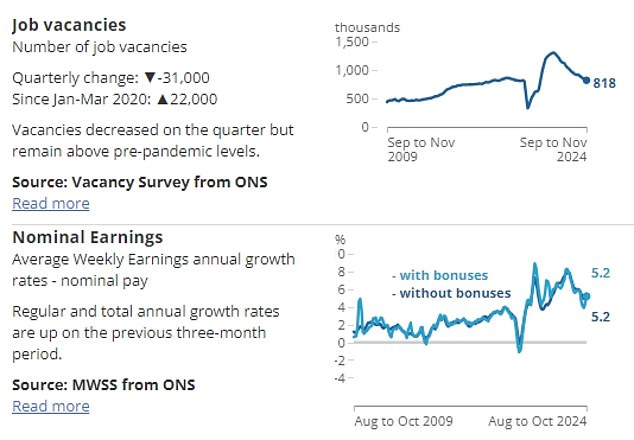Fears over the health of the UK economy were fuelled today as figures showed payroll numbers and job vacancies falling.
The number of employees was down 35,000 to 30.4million between October and November, in the wake of Labour’s tax-raising Budget.
Meanwhile, vacancies dipped by 31,000 to 818,000 in the three months to November.
The latest figures from the Office for National Statistics (ONS) also show that wages were rising faster in the run-up to Rachel Reeves delivering the fiscal package.
Regular earnings growth jumped to 5.2 per cent in the three months to October, up from 4.9 per cent in the previous three months and the first time it has risen since August last year.
Earnings growth also outstripped the headline CPI inflation rate by 3 per cent in the three months to October. The high numbers could harden the Bank of England’s view against interest rates cuts this week.
The number of vacancies dipped by 31,000 to 818,000 in the three months to November

The latest figures from the Office for National Statistics ( ONS ) also show that wages were rising faster in the run-up to Rachel Reeves delivering the fiscal package
ONS director of economic statistics Liz McKeown said: ‘After slowing steadily for over a year, growth in pay excluding bonuses increased slightly in the latest period, driven by stronger growth in private sector pay.’
On payrolls, she added: ‘We have seen annual growth rates continue to slow, showing a consistent trend with our latest jobs data from employers.
‘The number of job vacancies has also fallen again, though the total remains a little above where it was before the pandemic.’
Work and Pensions Secretary Liz Kendall said: ‘Today’s figures are a stark reminder of the work that needs to be done.
‘To get Britain growing again, we need to get Britain working again – so people have good jobs which pay decent wages and offer the chance to progress.’
Sarah Coles, head of personal finance at Hargreaves Landsdown, said: ‘There’s a disconnect between the rising tide of misery among businesses, anxiety building for economists, and festive cheer running rampant among the workforce: these figures show why.
‘For businesses, the Budget brought huge challenges of rising employment costs, so every announcement of recent weeks has been laced with dire warnings of what the future might hold in store. Falling vacancies could be an early sign of more to come.
‘For economists, rising wage inflation is a matter of concern, because there’s the risk it means businesses raise prices to cover wage costs, and inflation becomes embedded in the economy again.
‘Anyone wondering whether we might get another interest rate cut this week can now be fairly confident it’s going to be off the table entirely in December.’

The number of employees was down 35,000 to 30.4million between October and November, in the wake of Labour’s tax-raising Budget

